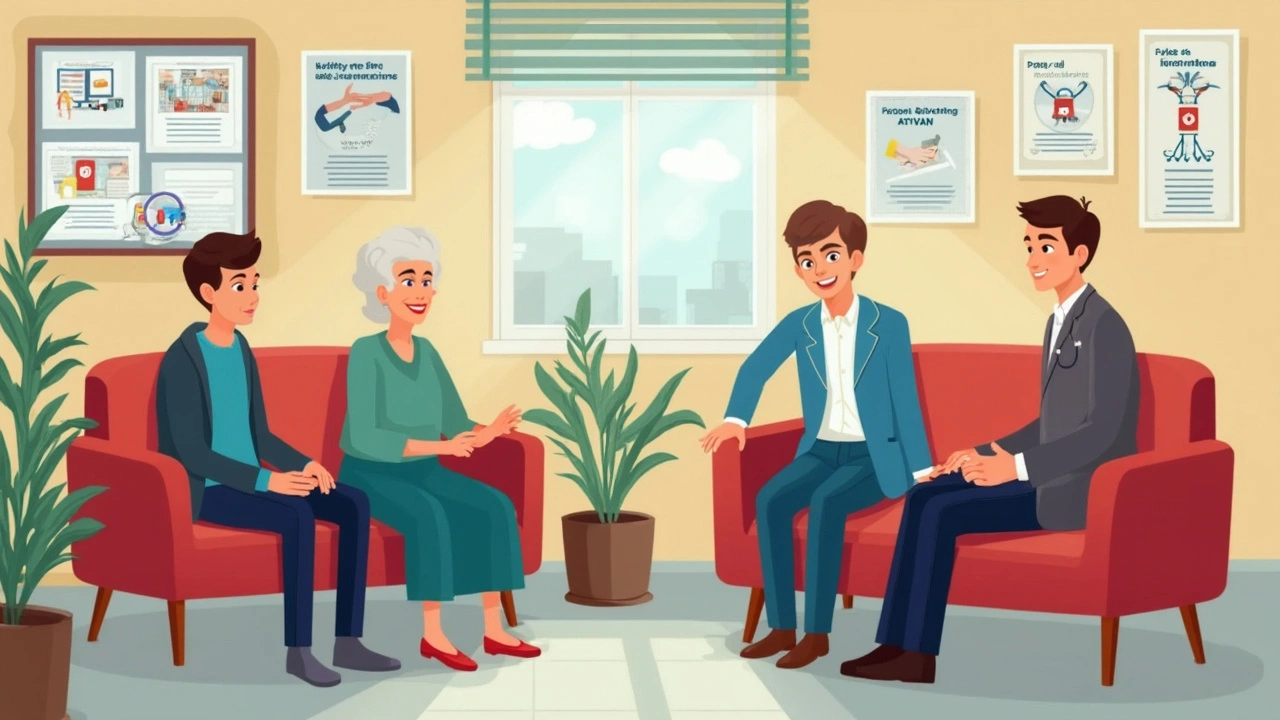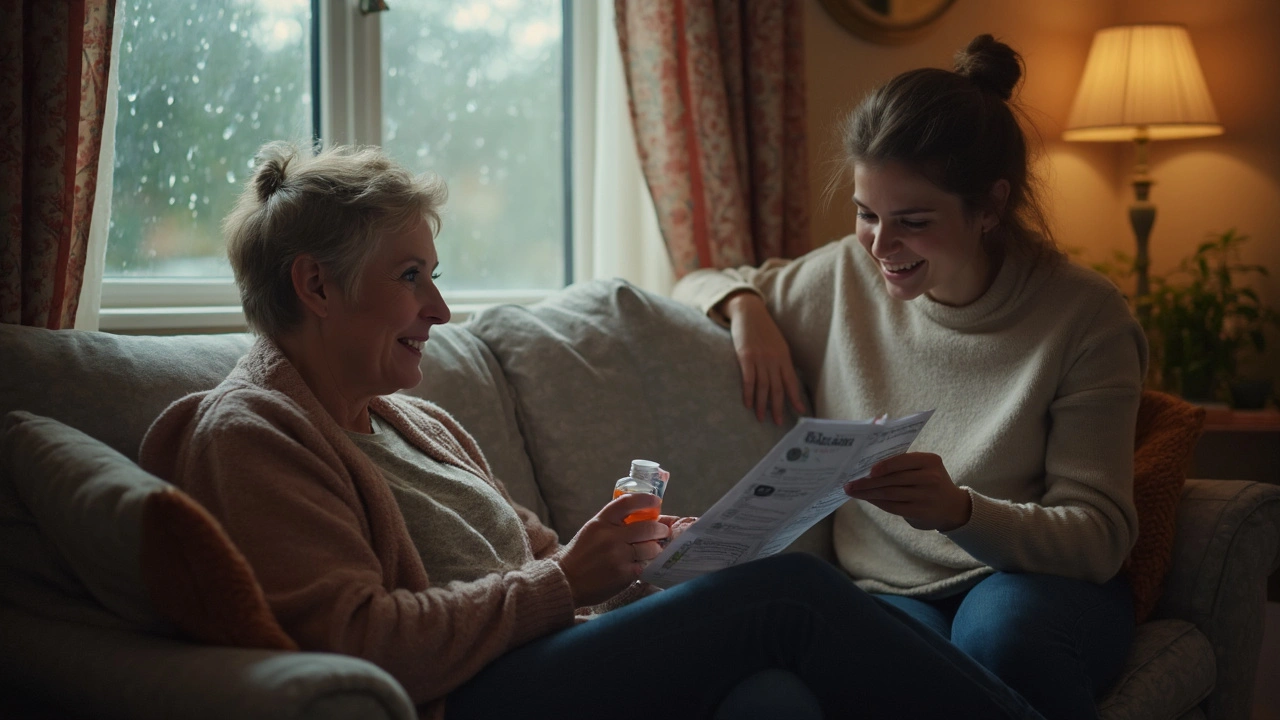Picture a pill that can melt anxiety in minutes but comes with a warning label heavy enough to fill an entire pharmacy wall. That’s Ativan. Its power to hush panic and calm nerves has made it a household name, but there’s a whole universe of details behind every tiny tablet. If you’re curious about what makes Ativan tick, why it’s prescribed with caution, and how it fits into real lives, stick around. By the time you’re done reading, you’ll know what’s myth, what’s fact, and what’s just plain wild about Ativan.
What Exactly is Ativan and How Does It Work?
Ativan is the brand name for lorazepam, a member of the benzodiazepine family. Benzos, as most people call them, have been around since the 1960s—revolutionizing how doctors approach anxiety, insomnia, and even certain seizure disorders. But what sets Ativan apart? Lorazepam acts fast, often within 30 minutes, and hits hard, which makes it a favorite for those storms of panic or when anxiety creeps in and refuses to let go. Unlike some longer-acting cousins, like diazepam (Valium), Ativan tends to wear off a little sooner, giving it less ‘hangover’ effect the next day but requiring careful timing if someone needs all-day relief.
Here’s what’s happening behind the scenes: Ativan boosts the effect of a brain chemical called GABA. Think of GABA as the body’s natural chill pill. When its effects are amplified, neurons stop firing wildly, muscles relax, and the brain shifts gears from chaos to calm. This is why Ativan is powerful for things like a sudden panic attack or calming someone before surgery — its action is quick and direct. But because the drug basically puts the brakes on the brain’s ‘noise,’ it’s not just shutting down anxiety. You might also notice drowsiness, fuzzy thinking, or an all-around slow-down, especially if you’re new to it.
Doctors love Ativan in formal settings, too. Emergency rooms keep it stocked for acute seizures or alcohol withdrawal, situations where nerves are literally firing out of control. Psychiatrists often reach for it as a ‘rescue medication’ for severe panic attacks or for short-term sleep issues. Sadly, it’s rarely used for months on end because of a big elephant in the room: tolerance. The body gets used to it, needing more for the same chill, and withdrawal can feel like a whole new nightmare. That’s why most doctors are sticklers for limited scripts and careful monitoring.
If you’ve ever wondered how Ativan compares to similar drugs, here’s a handy cheat sheet:
| Meds | Onset (minutes) | Duration (hours) | Main Uses |
|---|---|---|---|
| Ativan (Lorazepam) | 20–45 | 6–8 | Anxiety, panic, seizures, insomnia, withdrawal |
| Xanax (Alprazolam) | 15–30 | 4–6 | Panic, anxiety |
| Valium (Diazepam) | 15–60 | 20–80 | Anxiety, seizures, muscle spasms |
As for weird facts? Lorazepam actually shows up in a surprising place: evidence bags. Because it’s a controlled substance, hospitals track it like gold, with every pill and vial meticulously logged. If you see a pharmacist running inventory with barcodes in a hospital, there’s a good chance Ativan is on the checklist.

Uses, Benefits, and the Flip Side of Ativan
Ativan gets handed out for everything from public speaking jitters to medical procedures where nerves would otherwise hijack the whole day. Let’s break it down: Doctors typically prescribe it for short-term management of anxiety disorders, panic attacks, certain sleep problems, severe agitation, and, occasionally, for treating nausea during chemotherapy. It’s also a hero drug in intensive care units where controlling status epilepticus (unstoppable seizures) can literally save a person’s life.
If you’re thinking of Ativan purely as a ‘nerve pill,’ here’s a broader look. Some dentists use it for especially anxious patients ahead of surgery. Cancer patients sometimes get it to control nausea when other meds don’t work. And yes, a small set of folks even carry it as an emergency fix for sudden panic or PTSD flashbacks. It’s not just about calming the mind; it’s also about resetting the body when things feel out of control. That’s why Ativan is sometimes called a ‘rescue remedy’ by patients who find little else works quite as fast.
Now, let’s talk about the not-so-fun side. Ativan doesn’t just turn down the volume on anxiety – it can quiet other systems, too. Drowsiness, confusion, forgetfulness, and coordination problems are all on the menu, especially for older adults. These effects show up fast and, sometimes, unexpectedly. There are stories of people getting up in the night while on Ativan and not remembering what they did come morning. This odd side effect, called ‘anterograde amnesia,’ can be both helpful (for surgery) and risky (think: sleepwalking through your kitchen).
The real kicker is dependency. In 2021, the CDC reported that nearly 2.3 million Americans misused benzodiazepines, often chasing the calm they once felt. Tolerance sneaks in quietly—you might barely notice until it takes two pills to feel what one used to do. When it’s stopped suddenly, withdrawal can hit with insomnia, agitation, and (rarely, but scarily) seizures. That’s why the biggest tip if you’re on Ativan: don’t quit cold turkey. Always work with your doctor on a taper schedule.
There are quirky things, too, about how it’s processed by your body. Lorazepam isn’t broken down by the liver in quite the same way as other benzos, so it’s sometimes used in people with liver issues. But that doesn’t mean it’s risk-free—just that it’s the ‘safer’ pick sometimes.
So, how common is all this stuff? About 19.5 million prescriptions for lorazepam were written in the US in 2023, according to IQVIA, a healthcare data firm. The World Health Organization put it on its List of Essential Medicines, which means it’s considered crucial for global health. Yet, even with all these benefits, every single script comes with warnings about how slippery the slope to misuse can be.
What trips people up most? It’s sneaky. The relief is so complete that cutting back feels impossible. Friendships, jobs, and family life can all get tangled up if dependency develops. Trust me: every ER nurse has tales about someone who started Ativan to get through a tough patch and wound up chasing that original feeling. That’s a huge reason doctors hand it out grudgingly and with tons of education.

Real-Life Tips and Insights for Safe Ativan Use
If your doctor prescribes Ativan, think of it like borrowing a friend’s Ferrari—treat it with respect, or you’ll regret it. Here’s what’s helped real people use it safely:
- Take the smallest dose that works. More isn’t better. Most anxiety responds to low doses, and smaller amounts reduce the odds of bad side effects.
- Use it for the shortest time possible. Doctors usually recommend two to four weeks tops for daily use. If you need it longer, expect frequent check-ins and maybe even a tapering plan.
- Treat alcohol like it’s radioactive. Mixing Ativan with booze can stop your breathing—literally. The risk goes up if other sedatives (like sleep aids or painkillers) are on board.
- Plan for the after-effects. Ativan can linger (especially in older folks), so avoid driving, making important decisions, or operating heated curling irons until you know how it hits you.
- Keep track of how you feel. Some people carry a notebook or use a phone app to note when they take a dose, how they feel after, and any side effects. This info makes doctor visits way more productive.
- Ask about non-drug options. Therapy, meditation, better sleep routines, and even regular exercise can be as effective as Ativan for many. Using the pill as a bridge while you work on those habits can make it easier to quit.
- Be honest with your prescriber. If you’re taking more than prescribed or feel withdrawals between doses, speak up. Stigma keeps people silent, but a good doctor wants to help, not just scold.
What about myths? One of the biggest is that Ativan is ‘safer’ than Xanax or less habit-forming. Not true. Studies show the difference really boils down to how you use it and for how long. And don’t be fooled by natural supplements that claim to be ‘herbal Ativan’—none are regulated or shown to work like lorazepam. Any supplement affecting the brain can interact badly, especially with a drug as powerful as this one.
Here are some signs it’s time to chat with your doctor:
- You’re taking Ativan daily, not just during rough patches.
- You need higher doses for the same effect.
- You feel shaky or panicked if you miss a dose.
- Friends or family mention changes in your memory or mood.
If you ever feel symptoms like trouble breathing, severe confusion, or a slowed heartbeat, seek help immediately—those are signs of a dangerous reaction, especially if other sedatives or alcohol are involved. Emergency rooms see cases like this more often than you’d think, especially among older adults who mix up medication times or don’t realize the risks.
And the ongoing debate continues. Should benzodiazepines be prescribed as freely as they still are? The DEA rolled out tighter guidelines in recent years, and pharmacies track prescriptions electronically to catch overlapping scripts. The big message from experts: Ativan can be a lifesaver, but only when used with care, honesty, and an open line between you and your doctor.
If you or someone you love is managing anxiety, don’t default to medication first. There’s a massive toolbox of non-drug therapies that don’t come with withdrawal or blackout risk. Cognitive-behavioral therapy (CBT) is one of the best studied, and even a few weeks of sessions can lead to a huge drop in panic attacks. Deep breathing exercises, journaling, and support groups are just as worthy of trying. If Ativan is still the right move, at least you’ll go in with eyes wide open and a plan to step off as soon as you can.
Anxiety can feel overwhelming, but with the right support team—including medical advice, safe medication use, and honest tracking of symptoms—it’s manageable. The trick is to use every tool available, with Ativan as just one part of a much bigger picture. You’ll never see it hyped on TV or Instagram, but for many, it’s been both a blessing and a burden. That’s the story behind the calm.


Comments (11)
Tony Halstead
19 Jul, 2025This article does a commendable job addressing the multifaceted nature of Ativan as a benzodiazepine. One must appreciate that beyond just the pharmacological effects, the psychological and societal impacts merit nuanced discussion.
Ativan’s utility in anxiety management is well documented, yet the lurking dangers of dependence and cognitive impairment remain an ongoing challenge. It’s crucial to consider individual variability in responses, especially when weighing benefits against risks—something the article hints at elegantly.
I particularly like the emphasis on transparent communication with healthcare providers. Often, patients hesitate to disclose their concerns, which can lead to suboptimal outcomes.
Does anyone have personal experiences or thoughts on how to balance efficacy with safety when prescribing such psychoactive medications? It’s a complex dance between symptom relief and long-term consequences.
Looking forward to hearing diverse perspectives on this important topic.
TRICIA TUCKER
20 Jul, 2025Oh wow, I’m so glad this article is shedding light on the real-life experiences with Ativan. Sometimes, medical info feels too clinical, but adding stories from actual users makes it relatable.
One thing I always tell my friends and family is never to demonize or glorify meds like Ativan. It’s all about knowing your body and working closely with your doctor. I appreciate the article’s tips on safe use because it’s so easy to get mixed messages online.
Has anyone struggled with dependency or withdrawal? It’d be super helpful to learn how you managed those challenges without judgment!
Also, the part about how to talk to your doctor really stood out to me. Asking questions and being honest about what you’re feeling is key.
Anyway, thanks for sharing this! It’s tough navigating anxiety, and articles like this offer a bit of a roadmap.
Dave Tu
21 Jul, 2025While the article is informative, I must express skepticism about the widespread prescription of Ativan. The risks often outweigh the perceived benefits, especially given the potential for dependency and cognitive dulling.
Pharmacologically speaking, benzodiazepines like lorazepam should be reserved for short-term use under stringent supervision, yet it seems they are sometimes handed out with less caution than warranted.
The social repercussions—overreliance on medication for anxiety rather than seeking deeper therapeutic interventions—worry me. Are we treating symptoms or merely masking underlying issues?
I urge anyone considering Ativan to thoroughly evaluate alternative treatments and understand the risk profile before proceeding.
Opinions?
Johnna Sutton
21 Jul, 2025yall thinking its all safe, lets not forget that these big pharma companies are pushing these benzos like candy.
they want us hooked, there’s a reason for this. dependency rates, withdrawal hell, and no one really tells the whole story until ur trapped.
i don't trust docs when they just write out Ativan without questioning where the treatment is really going.
research the shadow side of these meds, i swear the truth is hidden to keep profits flowing.
anyone else feels this way or is it just me?
Vinay Keragodi
22 Jul, 2025This article is quite fascinating and raises many points to ponder. I appreciate the detail on how Ativan works mechanistically, as well as the focus on safe use.
Given my background in neuroscience, I think it is important to understand the neurochemical interactions lorazepam entails within the GABAergic system and how that modulation impacts anxiety symptoms.
However, I wonder about long-term neuroplastic changes that can occur with continued use, and how that might affect recovery trajectories.
Practically speaking, do users here have experience with tapering strategies? I'd love to hear what has worked or failed.
Thanks for sharing!
Anil Karwal
22 Jul, 2025Interesting read, though I would caution everyone about jumping on Ativan as a first-line option without exploring other anxiety management techniques.
Therapies such as CBT, mindfulness, and lifestyle changes can often mitigate symptoms without the risks that come with benzodiazepines.
Sure, Ativan has its place, and it does help many, but patient education and doctor follow-up are critical to preventing overdose or misuse.
Sharing personal experiences with tapering or combining treatments would enrich this discussion.
What do others think?
Millsaps Mcquiston
23 Jul, 2025Honestly, I'm all for prescription meds that actually help, but Ativan seems like a slippery slope.
People expect relief but may not realize the fog and slowed reactions that come with its use.
The dependency risk is real, and I don’t think many doctors talk about that enough upfront.
It's sometimes better to tough it out or seek non-pharmacological options before going to benzos.
This article is a good start but could be more upfront about how tough quitting can be.
michael klinger
23 Jul, 2025This piece is a nice overview, but let’s not overlook the potential conspiracies behind the mass promotion of benzodiazepines.
Drug companies have vested interests, and the push for meds like Ativan can sometimes overshadow the necessary critical scrutiny.
At the same time, it’s undeniable that for many, these medications offer relief that otherwise would be absent.
I’m curious how physicians are influenced in their prescribing habits, and whether patients are fully aware of the risks involved.
Are we being told everything?
Matt Laferty
24 Jul, 2025Having counselled many patients through benzodiazepine use and withdrawal, I can attest that while Ativan is beneficial in acute anxiety episodes, long-term use poses significant challenges.
The pharmacodynamics of lorazepam make it potent yet risky if not carefully managed, leading to tolerance and physical dependence.
One must approach its use with a comprehensive plan, incorporating psychological support and gradual tapering schedules to ensure safety.
This article touches on these aspects, but I’d emphasize more on the monitoring protocols that clinicians should follow to minimize harm.
Does anyone have experience with successful tapering strategies or managing rebound anxiety after Ativan cessation?
Danielle Spence
25 Jul, 2025I find it morally imperative to stress that reliance on benzodiazepines like Ativan could be a slippery slope toward dependency without real healing.
While relief from anxiety is essential, one must seek holistic treatment approaches and not simply medicate away symptoms.
The article’s mention of open dialogue with doctors is key; patients should demand full transparency and alternatives.
Moreover, society should address the root causes of anxiety instead of relying primarily on pharmaceuticals.
Would love to hear others’ thoughts on this ethical perspective.
Dhanu Sharma
25 Jul, 2025This post and the comments here have really opened my eyes to the complexities of Ativan use.
From my viewpoint, understanding both pharmacology and the human experience is crucial.
I’m curious how cultural factors in different countries might affect prescribing patterns and attitudes toward benzodiazepines.
Does anyone have insight on whether Ativan is managed differently outside of Western medical systems?
Thanks for the thoughtful discourse!